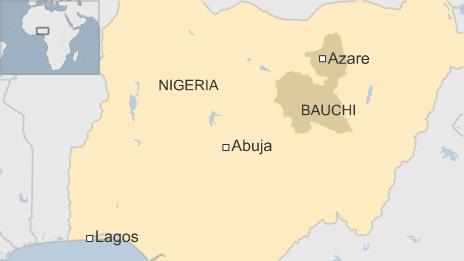Nigerians killed in Bauchi state cash machine blast
- Published

At least 10 people have been killed in a bomb blast as they queued to withdraw money from a cash machine in northern Nigeria, residents have told the BBC.
Security operatives say a female suicide bomber was responsible for the attack in Azare, Bauchi state.
No group has said it carried out the attack but suspicion is likely to fall on Islamist militant group Boko Haram.
The group has killed thousands since 2009 in its campaign to set up an Islamic state in north-eastern Nigeria.
Boko Haram has in the past claimed responsibility for similar attacks in the north.
The attack took place outside the branch of the First Bank in Azare, not far from a bus station where a bomb killed several people last month.
One eyewitness told the BBC he heard an explosion and then turned to see clouds of smoke.
"After the smoke had dissipated, we saw a number of bodies - I saw with my own eyes at least nine bodies without heads or limbs," he said.
Who are Boko Haram?
- Founded in 2002
- Initially focused on opposing Western education - Boko Haram means "Western education is forbidden" in the Hausa language
- Launched military operations in 2009 to create Islamic state
- Thousands killed, mostly in north-eastern Nigeria - also attacked police and UN headquarters in capital, Abuja
- Some three million people affected
- Declared terrorist group by US in 2013
Police spokesperson Haruna Muhammad told the BBC that the investigation is still ongoing, but police have arrested four people suspected of involvement in the incident.
It is not clear how many died in the blast. Police say seven people lost their lives and 10 were injured.
But hospital sources say 14 people died and more than 20 were injured.
The BBC's Ishaq Khalid in Bauchi state says many people from the neighbouring states of Borno and Yobe go to Azare to withdraw money as they have no banks in their areas or the cash machines are not working.
Borno and Yobe are two of the states worst affected by the Boko Haram insurgency.
The unrest has intensified in recent months, with the militant group for the first time managing to capture and keep hold of towns and villages, where they have declared a caliphate.
BBC Nigeria correspondent Will Ross says it appears to many Nigerians that the politicians are far more concerned with next year's elections than with trying to end the conflict.
The government last month declared that a ceasefire agreement had been reached, which would include the release of 219 schoolgirls kidnapped by the group in April.
Boko Haram, however, released a video denying any deal.